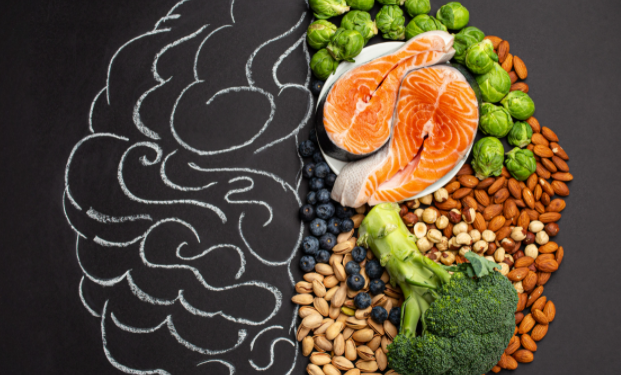by Dr. Shane Steadman, DC, DACNB, DCBCN, CNS
Our brain is the most metabolically-active organ in the body. In a resting state, the brain utilizes about 20% of the body’s energy. Even when we are sleeping, the brain is active with processing and transmitting information. Food and nutrition play a role with mood, behavior, cognitive function, sleep, and energy. People often notice certain foods will influence function. For example, dark chocolate can make some people feel happier, whereas caffeine helps others to feel sharper and more productive. While food and nutrition can improve function, it can be the opposite for other foods. Inflammatory foods can lead to brain fog and changes in memory, as well as contribute to migraines. There is even discussion of a connection between diabetes and Alzheimer’s.
There is so much discussion around certain diets, foods, and supplements. The ketogenic diet has become popular with supporting certain conditions like seizures. The Mediterranean diet has been viewed as beneficial for brain function due to the consumption of healthy fats, oils, and fish. A change in dietary habits can be the quickest way to make a change for a better brain. Many studies and articles suggest that reducing inflammatory foods and decreasing oxidative stress can improve longevity of brain. Implementing changes can start with vegetables.
Your mom always said to eat your veggies and now you have good reasons to do so. Vegetables provide antioxidants, vitamin K, folate, beta carotene, vitamin E, and much more. The rule of thumb is the more color and darker, the better. This rule of thumb also pertains to fruit. Fruits like blueberries, blackberries, pomegranates, kiwi, and strawberries contain flavonoids, antioxidants, and vitamins such as vitamin C. Many articles and studies suggest eating fruits high in flavonoids and antioxidants can help with nerve signals, transmission, and even supporting the hippocampus for memory. When following the rule of thumb, two-three cups of vegetables and one-two cups of fruit a day is the goal.
The human brain is about 60% fat. Consuming nuts, seeds, and healthy oils is the next step into promoting a healthy brain. Foods like almonds and walnuts are high in antioxidants and essential fatty acids (EFAs). Seeds such as flaxseed, chia seed, and pumpkin seeds are other foods that provide EFAs and support the brain. As mentioned earlier, the Mediterranean diet consists of healthy fats and oils. Olive oil is synonymous with this eating style. Unhealthy fats such as trans fats can lead to inflammation and oxidative stress. Cooking with and consuming healthy fats can yield big rewards later with aging. Simply substituting olive oil or coconut oil instead of vegetable oil for cooking is a start. Other oils such as grapeseed, flaxseed, and olive oil can be great on salads.
Along the same thinking as fat, another great way to get healthy fats into our diet is consuming fish. Fish provides high-quality protein and essential fatty acids that are great for brain function. Two different type of fats come from fish: EPA and DHA. DHA is the primary fatty acid that helps with reducing inflammation, cognitive function, memory, signaling, recovery, and much more. The body can only make a small amount of DHA, and therefore needs to be supplemented through diet. The goal is to consume fish once a week. For those who cannot and do not like eating fish, supplements can be used instead. When taking a supplement, maintenance is approximately 2,000 – 3,000 mg per day.
Overall, when looking at nutrition and brain health, we can consume many foods daily or weekly to support a healthy brain. It does not need to be difficult or expensive to implement something like this into your regimen. In addition to the above, other foods to look at for brain health include foods such as avocados, turmeric, broccoli, dark chocolate, and green tea. Go online, learn new recipes, and have fun.
Dr. Shane Steadman, DC, DACNB, DCBCN, CNS, is the owner and clinic director of Integrated Brain Centers. To learn more about how they can help with concussions, stroke, and TBIs, please visit www.integratedbraincenters.com. For a free consultation, please call 303-781-5617.











